Brand New DS1620xs NAS Drive from Synology – BEST NAS EVER!
The Synology 2020 Launch Exhibition is still happening here and I am pleased to confirm ANOTHER new NAS for 2019/2020. Is the Synology DS1620xs NAS server what you have been waiting for? I will admit, that is pretty unlikely, it is still remarkably new information and still a fair way from release but I will say that it is easily the most forward-thinking unit I have seen in their diskstation series yet and quite a few reasons why the DS1620xs has alot of potential. Featuring a powerful higher tier Intel CPU, SSD Caching bays, PCIe and some unparalleled LAN abilities, is the DS1620xs an earlier winner of the show so far? Let’s discuss.
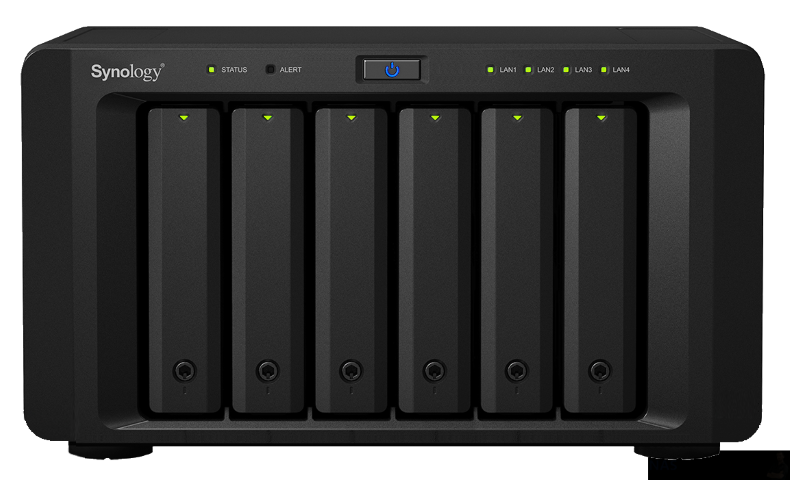
What are the Hardware Specifications of the DS1620xs Synology NAS Drive?
I know it is fantastically overstated, but the hardware in a NAS can change EVERYTHING. This isn’t a dull PC-builder point, I know that A+ software is ultimately what a NAS buyer should invest in, but the extent to which your Synology DS1620xs NAS and DSM 6.2/7.0 will run is largely governed by the internal hardware. Contrary to what Synology would admit, the Diskstation Manager software does not run the fullest or exact extent between devices. Perhaps the CPU is an ARM efficiency vs power processor or a beefy Intel with embedded graphics and VM support – the hardware makes all the difference and the Synology DS1620xs is no exception. It is with this in mind that we can say with a degree of certainty that the DS1620xs can do pretty much EVERYTHING in the entire Synology catalogue of applications, as well as support a huge number of other 3rd party applications. The inclusion of that Quad-Core Xeon CPU and the SSD NVMe caching bays means that internal speeds will be high. Likewise, the PCIe slot for adding 10/25/40Gbe network cards and those 4 2.5Gbe LAN ports means that you are looking at some serious external output too! Below are all the hardware specifications of the DS1620xs we know so far:

- CPU: Intel Xeon D-1527
- CORES: Quad Core
- FREQUENCY: 2.2 GHz (2.7 GHz turbo)
- MEMORY: 8-32GB ECC DDR4
- BAYS: x6 AND EXPANDABLE TO X16 TOTAL
- RAID SUPPORT: RAID 0, 1, 5, 6, 10
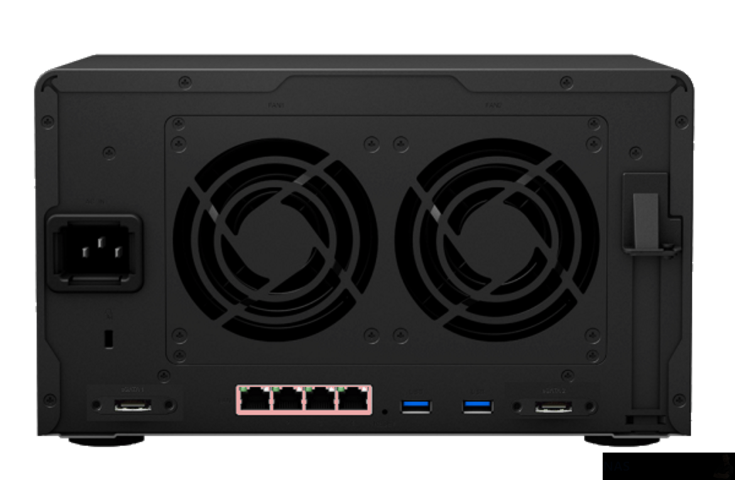
-
NUMBER OF FANS: x2
-
USB 3.0 PORTS: x2
-
RJ45 LAN PORTS: x4 at 2.5Gbe
-
EXPANSION PORTS: x2 for a DX517 Each over eSATA
-
Hot-Swap: Yes
-
CHASSIS MATERIAL: Metal
- PCIe: Yes
- NVME SSD Cache: Yes, 2x Dedicated NVMe Slots inside
- Warranty: 5 Years
Of course, these are subject to change prior to release, but Synology rarely makes massive changes to hardware once announced (only 2 or 3 examples in 10 years spring to mind). However, I want to take a moment to really, REALLY focus on those 4x 2.5Gbe ports. At first, I was sure there was a mistake or a misunderstanding. But here is the original translation:
The above is a translation from the product specification cards at the event itself. Now the more keen follower of this blog and my YouTube channels will know that the subject of 2.5Gbe was discussed with Synology in my Q&A will them this summer – at which it was highlighted that there were no concrete plans at that time to pursue the subject of 2.5/5Gbe LAN connectivity. So, either the above is a mistake, a miss-translation – OR – The Synology DS1620xs is going to be one of the most hotly anticipated NAS drives we will see for SMB in late 2019/2020.
Based on the Synology DS1620xs Hardware, What Software Applications Will It Support?
Now we now the Synology DS1620XS+ internal hardware and ports (or at least have a strong suspicion that those ports are true!), we can make some informed estimations on the software support that will be available at launch. You will, of course, have a good degree of support for the first part Synology applications for both home and business users, but for those that want to buy a Synology NAS for use with their own third-party environments/software, I am pleased to confirm that this hardware should enable the following:
- Synology Active Backup
- Synology Moments
- Synology Drive
- Synology Mail
- Synology Chat
- Synology Surveillance Station
- Synology Calendar
- Synology Virtual Machine Manager
- Synology Media Applications
- Plex Media Server
- Emby
- Docker
- Download Station
- Cloud Migration
- DLNA Media Server
The DS1620xs, like many of it’s older NAS brothers and sisters, is designed for a set type of user as the key buyer – in this case, business! Does the Synology DS1620xs sound like a device that interests you? Can it hope to compete with the popularity and power of the DS3617xs+?
When Will the DS1620xs Synology NAS Drive Be Released?
Sadly, we have ZERO information on this (something that can be said for most of the Synology NAS drive releases featured for this event) and can only assume that the DS1620xs will see an early Q4. However, with no real indication of this from Synology and nothing but releases histories from previous devices can be used as an indication. What I will also add is that a large number of buyers have been waiting on a NAS that could challenge the old favourite, the DS3617xs+ NAS… THIS could well be that NAS!
If I Cannot Wait Till the Synology DS1620xs NAS, What Should I Buy?
If you are looking to buy a NAS drive from Synology right now, then (despite the DS1620xs NAS‘ early appeal) I would recommend ordering sooner rather than later. A number of the key hardware specifications of the Synology DS1620xs NAS are available now in older devices and if the safety and integrity of your data are at stake, the DS1620xs is just not worth waiting for. I recommend the following NAS drive as a viable alternative which is available now f.
APRIL 2020 Update – Click Below to learn about an information Update we have on the DS220+, DS720+, DS420+ and DS920+
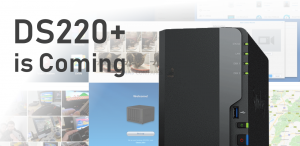 |
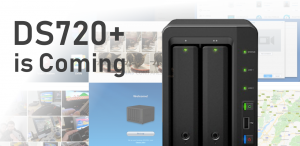 |
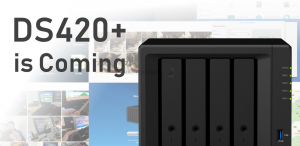 |
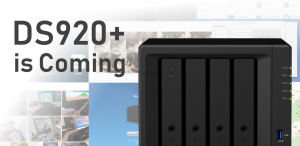 |
Further Information on the latest Hardware/Software releases from Synology can be found here – https://nascompares.com/2020/03/19/synology-2020-2021-everything-we-know-so-far/
When Can I Buy The Synology DS1620xs NAS Drive?
Right now, the Synology DS1620xs has only just been unveiled, so the official release is no doubt a fair way away. In the past, Synology has always made efforts to release their hardware towards the end of the year for Diskstation devices, and we do not have any reason to see this trend changing. Information like the DS1620xs release, confirmation of the specifications and how well this device will support DSM 6.2 and DSM 7.0 in Beta will be updated.
🔒 Join Inner Circle
Get an alert every time something gets added to this specific article!
This description contains links to Amazon. These links will take you to some of the products mentioned in today's content. As an Amazon Associate, I earn from qualifying purchases. Visit the NASCompares Deal Finder to find the best place to buy this device in your region, based on Service, Support and Reputation - Just Search for your NAS Drive in the Box Below
Need Advice on Data Storage from an Expert?
Finally, for free advice about your setup, just leave a message in the comments below here at NASCompares.com and we will get back to you. Need Help?
Where possible (and where appropriate) please provide as much information about your requirements, as then I can arrange the best answer and solution to your needs. Do not worry about your e-mail address being required, it will NOT be used in a mailing list and will NOT be used in any way other than to respond to your enquiry.
Need Help?
Where possible (and where appropriate) please provide as much information about your requirements, as then I can arrange the best answer and solution to your needs. Do not worry about your e-mail address being required, it will NOT be used in a mailing list and will NOT be used in any way other than to respond to your enquiry.

|
 |
WHY IS PLEX A BIT S#!t NOW? IS 2026 JELLYFIN TIME? (RAID Room)
Synology FS200T NAS is STILL COMING... But... WHY?
Gl.iNet vs UniFi Travel Routers - Which Should You Buy?
UnifyDrive UP6 Mobile NAS Review
UniFi Travel Router Tests - Aeroplane Sharing, WiFi Portals, Power Draw, Heat and More
UGREEN iDX6011 Pro NAS Review
Access content via Patreon or KO-FI
Discover more from NAS Compares
Subscribe to get the latest posts sent to your email.


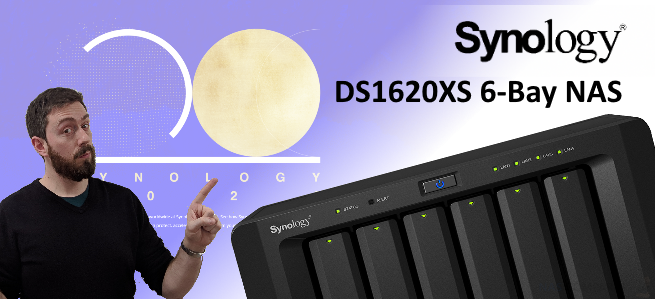
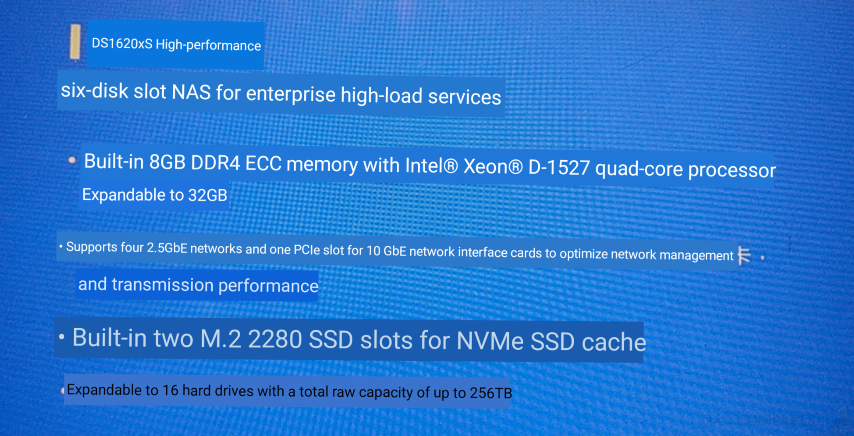




Great to see Synology moving the XS line forward with PCIe expansion, inbuilt NVMe and NBASE-T and the Intel Xeon D-1527 CPU has likely at least twice the performance (given hyperthreading) compared to the the Intel Atom C3538 in the DSxx19+ plus range – My only concern is that the DS1620xs uses a CPU which doesn’t support Intel QuickSync for hardware transcoding – Here’s hoping some new DSxx20+ plus models will be announced with similar features and newer Intel Gemini/Coffee Lake CPUs (similar to the Intel NUCs) which also support hardware transcoding!